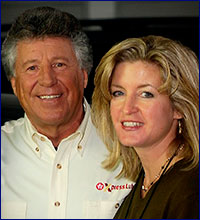We Interrupt this Commercial
Message with a Deaf Child
by Leeanne Seaver

Auto-racing legend Mario Andretti probably never thought he’d see himself in a newspaper about families with children who are deaf or hard of hearing (DHH). But he’s here to help make a point: Leeanne Seaver never saw this coming either. I was a workaholic broadcast writer/producer/director with what I believed were unlimited professional possibilities. Ask me how many producers does it take to change a light bulb? A: Does it have to be a light bulb?
Then came the day when I begged for a longer lunch-hour from the TV station where I worked to make an ABR appointment that would definitely prove that our baby boy, Dane, couldn’t hear. That was in 1989, and I’ve juggled the career I was trained for with the vocation thrust upon me ever since. On good days I strive to rise mightily to the occasion; on bad days I mentally compose a sympathetic eulogy that I fantasize will be read by my grown son who wishes he’d appreciated me more.
“Any idiot can face a crisis; it is this day to day living that wears you out.” -- Anton Chekov
Ninety-five percent of us are hearing parents with a DHH child, (Mitchell & Karchmer, 2004) and 90% of that number are parents with absolutely no background or experience in deafness or connection to the deaf community, (Center for Demographic Studies, 1984). So it is safe to say that in general, learning our child is deaf or hard of hearing is a shock. For me it was also frightening, which I now recognize as fear of the unknown.
Frankly, most hearing people don’t automatically know how to function without a sense of hearing, so it’s not untypical to react to their child’s hearing loss or deafness from basic “survival mode”—how do we fix this?! Reactions like this should not be experienced as an affront to the Deaf Community, but as a predictable response from someone learning his/her familiar world is now irretrievably altered. This is true even for many Deaf parents upon learning their newborn can hear. It’s often a shock and unwelcome news. For hearing parents with DHH kids and for Deaf parents with hearing kids, these feelings are emotional markers for the beginning of the journey. Life does return to normal, but “normal” will be different than it was before. (This will be true regardless of the communication mode or method and/or amplification technology your family chooses. Trust me on this one.) With good support, all families move quickly past “survival” and into the business of leading rich, full lives.
For me, adapting to the new world meant learning to live with a constant sub-current of concern. Sure, I can direct a three-camera shoot on a million dollar set while pacifying multiple celebrity egos, but disciplining a simple parking lot tantrum filled me with crippling self-doubt…problems could never be simply chalked up to “two-year old behavior.” The lingering anxiety about miscommunication hangs long into the night. And the next night. How would I have handled that if he was hearing? How should I have handled it since he’s deaf? Will he be in therapy one day because I punished him? Will he become an axe murderer because I didn’t?
As painful as this can be, having a child with a “disability” (admittedly not the term used around our house) stretches us, and that’s a good thing. We move up the learning curve…replacing anxiety with newfound “different abilities” and a surprising amount of knowledge of many things we’d never even thought of before. This came in handy the time my boys were acting out the “blood brother” ceremony they’d seen in a documentary about Native American tribes. I retrieved the pocket knife in spite of their protests that this was their true test of courage…heck, no one in the movie even flinched! “Then Indians must suffer from a severe neurological dysfunction and sensory-integration disorder,” I countered.* They just shook their heads, resigned to having a mother so pathetically lacking in the kind of knowledge they considered important.
*I don’t really believe that, FYI.
“There are years that ask questions, and years that answer them.”
-- Zora Neale Hurston
In a perfect world, primitive tribes evolve beyond mere survival into advanced civilizations leaving their signature of language, art, music, poetry, dance and long-format industrial videos in high def. Somewhere between our humble origins as newbie hearing parents and the sophisticated, confident old cronies we’ll become, isn’t our evolution something like that? Don’t families move beyond primal fear of an unfamiliar world into the art of living there? Their days a complicated choreography of employment, appointments, website sleuthing, sibling and extended family needs, classes, effective communication, educational advocacy, laundry, meals, homework and “quality” time. Where is the Oscar for that performance?
I watch my hearing son, Dakota, head out to join a group of guys (which will include Dane, the only one who’s deaf) loading ATVs onto trailers for a day of four-wheeling. I know he’s not into this sport so I have to inquire. “Mom, if I’m not out there Dane will miss a lot of what’s going on.” After so many years of directing on so many fronts…on so many levels, I remain very happily backstage.
Leeanne Seaver © for Hands & Voices
|


